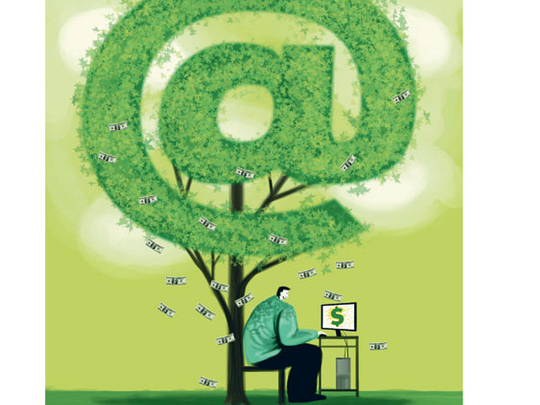
Undoubtedly, the internet has changed our daily lives and perspectives. It opened doors to get-knowledge-quick schemes and get-rich-quick schemes.
Yet, a nagging question remains: to what extent will the internet facilitate or impede business, and how far will it go towards making money?
Simple questions with thorny answers, if any are available so far.
Since the emergence of this platform for communications and discussion, blogs and social networks such as Twitter and Facebook, are mushrooming around the globe.
Today, it seems everyone is using the new technology; teenagers, young women and men, the old generation, celebrities as well as politicians and officials.
During the 2008 US presidential race, the then candidate Barack Obama used the new technology for his campaigns. You Tube, Myspace and Facebook were new channels, next to newspapers, TV and radio.
The British elections are expected to use a similar digital campaign.
The internet has removed boundaries and, in many cases, succeeds in evading censorship.
It offers a new channel for communication, where there are no limits and, in many cases, no cost.
Blogging leaders
While some official announcements are being sent on Twitter, more and more officials are becoming active bloggers.
In his blog, British foreign minister David Miliband, 44, quotes columnists, articles and comments on many issues related to foreign policy, ranging from human rights and the status of women in Saudi Arabia, to elections in Sudan, and UK's relations with Japan.
Moriz Leuenberger, the Swiss minister of environment, transport, energy and communication in his sixties, is also expressing his opinion on his blog on different political issues, internally and internationally. Singaporean Foreign minister George Yeo is another example.
He is allowing people to track his daily schedule, travel itinerary (when he is abroad), and share his thoughts and impressions with them, plus he is downloading pictures from his iPhone of the places he visits.
Wa'el Abbas, the first blogger to win an international press award a few years back, says the human touch in the blogging world works like magic.
"The more the blog of the official reflects his personal opinion and allows people to interact, the more successful it is," Abbas says.
"People like to interact with the official as [equal] human beings."
However, the impact of the new trend of digital diplomacy on international relations is yet to be seen.
"It is too early to judge the impact of the new technology [on international politics], as it is still a new experience," Abbas says.
Too early to judge
At the same time, it is too early to judge whether these social networking phenomena can generate cash and how much profit they could bring in.
Nobody knows.
Twitter, for example, only began collecting advertising revenue last week, though its audience potentially worth "billions of dollars" a year, according to Bill Gross, an internet entrepreneur who invented search advertising in late 1990s.
Still, the cash is coming from advertising on sites, search engines and web pages.
However, there are an increasing number of people taking advantage of this new technology to generate a new source of income, including those who are offering advice on how to make business on the internet and those who offer courses in online journalism.
Pay portals
Recently, a colleague corrected me when I gave him the portal of one of the biggest US newspapers as an example of online money-making.
A few years back, the portal was praised after it managed to generate revenues higher than the broadsheet for the first time in the history of that outlet.
"It is not because people found a way to make money from internet, it is because of decreasing advertisements in print media," he said.
He might be right, and he might not, as we don't know the exact source of revenue.
But what is known for sure is that the share of the internet advertisement market currently comprises 12.6 per cent of the overall advertising spend, a recent research predicated. By 2012 online advertising is set to soar to 17.1 per cent, ZenithOptimedia said.
Many believe that paid searches are a primary contributor to increase online advertisement.
But at the same time, I support the belief that any attempt to levy fees on any part of a portal will not be the right decision to make, while the internet has opened all spheres of communication.
All attempts to introduce fees to open certain posted material will not be successful, regardless of how good or bad the material is.
Already the failure of previous efforts has forced decision makers to reverse their decisions.












